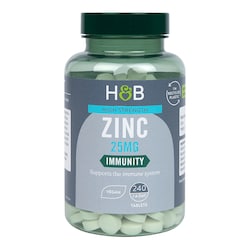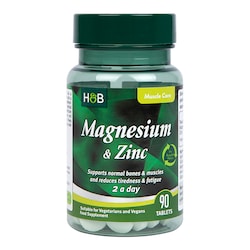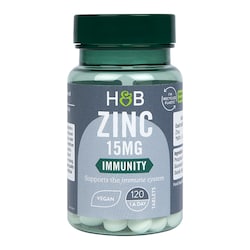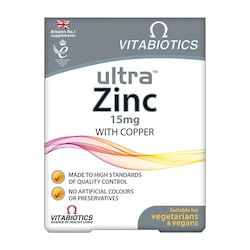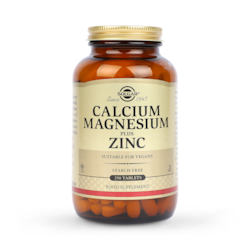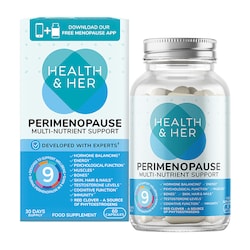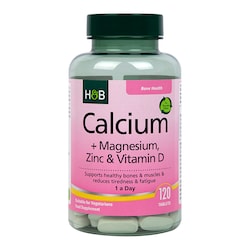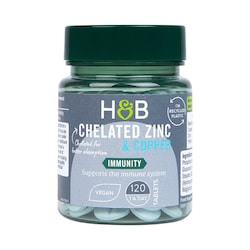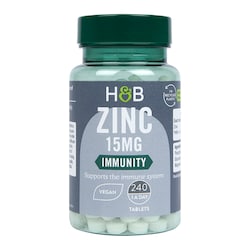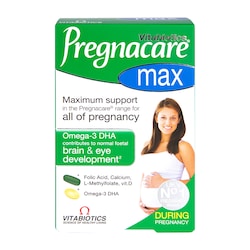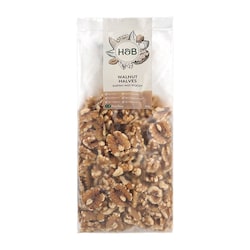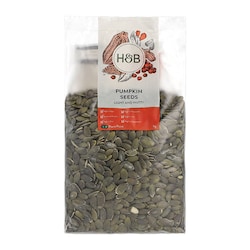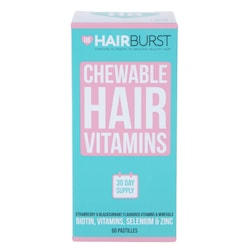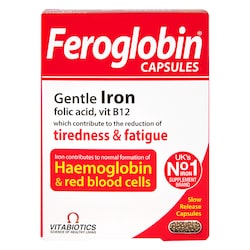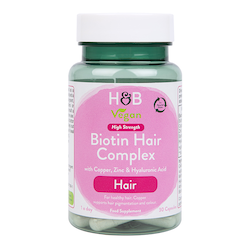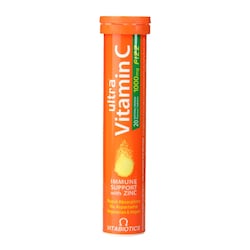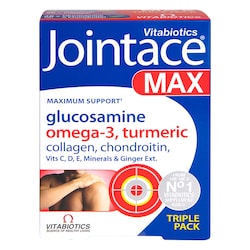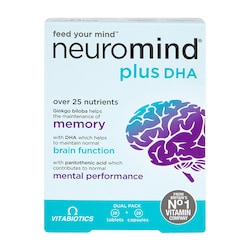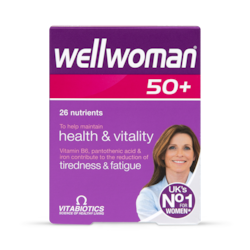20% off £30
Why take zinc supplements?
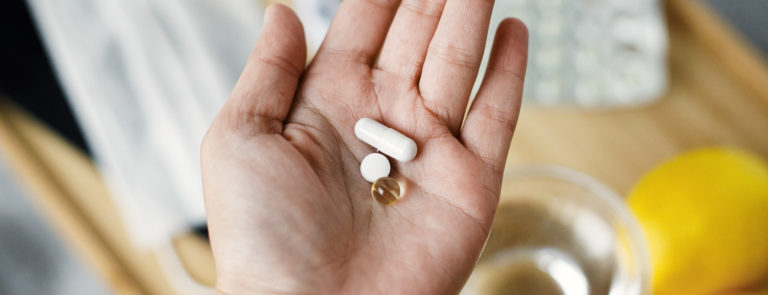
Why take zinc supplements?
Zinc is essential for good health. Of all the minerals in our body, iron is the most abundant mineral, closely followed by zinc.
Zinc can be taken in supplement form to help with a wide range of health conditions. Zinc has three main jobs within the body:
- Making new cells and enzymes
- Processing carbohydrate, fat and protein in our food
- Healing wounds.
As well as being available as a supplement, zinc is also present in food. Good food sources of zinc are:1
- Meat – is a particularly good source of zinc, especially red meat, such as lamb, beef and pork. A 100g (3.5oz) serving of raw ground beef contains 4.8mg of zinc, which is 44% of your Recommended Daily Allowance (RDA)2
- Shellfish – is a low calorie source of zinc. Oysters contain particularly high amounts, with 6 medium oysters providing 32mg or 291% of your RDA. Smaller shellfish, such as shrimp and mussels contain around 14% of the RDA per 100g3
- Dairy foods – such as cheese and milk. A 100g serving of cheddar cheese contains about 28% of your RDA and a cup of full-fat milk contains around 9%4
- Dark chocolate - contains some zinc too! A 100g (3.5oz) bar of 70 to 85% dark chocolate contains 3.3mg of zinc or 30% of your RDA5
- Nuts – pine nuts, peanuts, cashews and almonds all contain zinc. Cashews contain the highest amount, around 15% of your RDA for a 28g serving6
- Vegetables – contain minimal amounts of zinc. Potatoes, both regular and sweet potatoes, contain approximately 1mg per large potato, which is 9% of your RDA. Meanwhile, other vegetables, such as green beans and kale contain around 3% of RDA per 100g serving7
- Eggs – contain a small amount of zinc, with one large egg containing around 5% of your RDA8
- Wholegrains – such as wheat, quinoa, rice and oats contain some zinc
- Legumes – such as chickpeas, lentils and beans all contain good amounts of zinc. A 100g serving of cooked lentils contains around 12% of your RDA9
- Seeds – hemp, squash, pumpkin and sesame seeds all contain different levels of zinc. Hemp seeds contain the most, around 30g for every three tablespoons, which is between 31% and 43% of your RDA10
How much zinc should I take?
In terms of enabling our bodies to function healthily, this is how much zinc we need:
Men – 9.5mg a day.
Women - 7mg a day.
Note: The type of zinc you take can impact the dosage. For example, zinc sulfate consists of around 23% elemental zinc. Therefore, 220mg of zinc sulfate is the equivalent to around 50mg of zinc.11
Zinc and children
It’s essential children have adequate zinc levels because not having enough of it can impact the rate at which they grow and increase the chance of them developing infections, diarrhoea and respiratory diseases.12
The recommended intake for children aged between 1 and 8 years old ranges from 3 to 5mg, increasing as they get older.
Boys aged between 9 and 13 years old need 8mg of zinc a day. After the age of 14, this increases to 11mg a day.
For girls over the age of 8, the dosage stays at 8mg a day, except for 14 to 18 year olds, where the recommendation increases to 9mg a day.
Zinc and pregnant/breastfeeding women
Pregnant women and women who are breastfeeding should take between 11 to 13mg a day, depending on their age.
Ideally, we should all be able to get this zinc from our daily diet.
However, if we have too much of it, then it can impact our body’s ability to absorb copper, which can lead to anaemia and make our bones weaker.
Zinc is lost through sweat, making supplementation very important for athletes, who don’t get a lot of zinc through their daily diet
That’s why, if you are taking zinc supplements, it’s important not to exceed the recommended guidance.
Do not take more than 25mg of zinc tablets a day, unless you have been told otherwise by your GP.13
If you are deficient in zinc, then you may experience one or more of the following symptoms:14,15
- Low insulin levels
- Loss of appetite
- Irritability
- Generalised hair loss
- Rough and dry skin
- Slow wound healing
- Lack of taste and smell
- Diarrhoea
- Nausea
- Anaemia
- Hair loss
What is the best supplement for zinc?
There’s no overall ‘best’ zinc supplement because people take zinc tablets for different things.
However, you may find, if you’ve started to look around for zinc supplements, there are quite a few different types available:
The main different types of zinc supplements:
-
Zinc gluconate
This is one of the most common over-the-counter forms of zinc.
It’s used for: creating cold remedies, such as lozenges and nasal sprays.
-
Zinc acetate
Similar to zinc gluconate, zinc acetate is often added to cold lozenges.
It’s used for: helping speed up recovery from colds.
-
Zinc sulfate
Is most commonly used to help prevent zinc deficiency by boosting zinc levels.
It’s used for: Boosting the amount of zinc in the body.
-
Zinc picolinate
Some research has found the human body may be able to absorb zinc picolinate more effectively than other types of zinc.
It’s used for: Better zinc absorption.
-
Zinc orotate
This type of zinc is combined with orotic acid and happens to be one of the most common types of zinc supplements around.
It’s used for: treating some of the symptoms of low zinc deficiency.
-
Zinc citrate
According to research, this type of zinc supplement is as well-absorbed as zinc gluconate, but tastes better.
It’s used for: preventing zinc deficiency and treating diarrhoea.16

7 of the best zinc supplements (according to us)
What are the benefits of taking zinc?
Zinc supplements are used to help with several health conditions. We’ve listed some of the most common uses below:
-
Supporting immune systems
Zinc can be found in quite a few different medications and natural remedies because of its ability to potentially improve immune function and reduce inflammation.17
It’s believed it may also have antioxidant properties, which means it may possibly be effective for protecting against chronic conditions, such as heart disease and diabetes.
-
Controlling blood sugar levels
Zinc is widely linked to helping control blood sugar levels, as well as the production of insulin, which is responsible for transporting sugar from your bloodstream to your tissues.
Initial studies have also found it may balance out blood sugar levels and improve the body’s sensitivity to insulin.18
-
Helping with heart health
According to some research, zinc may lower triglyceride and cholesterol levels, which are two contributors to heart disease.
Meanwhile, other studies have found low levels of serum zinc may be associated with a higher risk of coronary heart disease.
However, further research is required to evidence this claim.19
-
Treating diarrhoea
One particular study found that taking zinc tablets for ten days is effective at treating diarrhoea and also helps prevent future bouts.20
-
Healing wounds
Zinc helps maintain skin integrity and structure.
Patients experiencing chronic wounds or ulcers often have deficient zinc metabolism and lower serum zinc levels. Zinc is widely used in skin creams for treating nappy rash or other skin irritations.
According to one piece of research, which analysed zinc’s impact on wound healing, topically applying zinc may help with leg ulcers by decreasing inflammation and bacterial growth.
However, further research, that evidences zinc sulfate’s ability to improve the rate at which chronic wounds and ulcers heal, is required.21
Are there any side effects to taking zinc?
Zinc supplements are considered to be a safe and effective way of increasing your zinc levels and helping with several health conditions.22
There have been some side effects linked to taking zinc tablets, they include:
- Nausea
- Vomiting
- Diarrhoea
- Stomach pain
People who take more than 40mg a day of zinc may experience flu-like symptoms, such as fever, coughing, headache and fatigue.
To avoid experiencing any of these side effects, do not exceed the recommended dose, unless advised to do otherwise by your GP.
It’s believed zinc supplements may also prevent the absorption of certain antibiotics, which may potentially reduce how effective they are, if both are taken at the same time.
If you experience any negative side effects after taking zinc supplements, speak to your GP as soon as possible.
Possible interactions
The following may interact with zinc supplements:24
Antibiotics
Taking zinc tablets while you're taking quinolone or tetracycline antibiotics can potentially interfere with their ability to fight bacteria.
Taking the antibiotic two hours before or four to six hours after taking zinc can minimise this effect.
Penicillamine
Taking zinc supplements alongside the rheumatoid arthritis drug Penicillamine reportedly reduces the drug's ability to ease arthritis symptoms.
Taking zinc at least two hours before or after taking the drug might minimise this effect.
Thiazide diuretics
It’s believed that these blood pressure drugs increase the amount of zinc lost in urine.
- https://www.nhs.uk/conditions/vitamins-and-minerals/others/
- https://www.healthline.com/nutrition/best-foods-high-in-zinc#TOC_TITLE_HDR_2
- https://www.healthline.com/nutrition/best-foods-high-in-zinc#TOC_TITLE_HDR_5
- https://www.healthline.com/nutrition/best-foods-high-in-zinc#TOC_TITLE_HDR_7
- https://www.healthline.com/nutrition/best-foods-high-in-zinc#TOC_TITLE_HDR_10
- https://www.healthline.com/nutrition/best-foods-high-in-zinc#TOC_TITLE_HDR_6
- https://www.healthline.com/nutrition/best-foods-high-in-zinc#TOC_TITLE_HDR_10
- https://www.healthline.com/nutrition/best-foods-high-in-zinc#TOC_TITLE_HDR_7
- https://www.healthline.com/nutrition/best-foods-high-in-zinc#TOC_TITLE_HDR_5
- https://www.healthline.com/nutrition/best-foods-high-in-zinc#TOC_TITLE_HDR_6
- https://www.healthline.com/nutrition/zinc-supplements#dosage
- https://www.medicalnewstoday.com/articles/263176#benefits
- https://www.nhs.uk/conditions/vitamins-and-minerals/others/
- https://www.webmd.com/vitamins/ai/ingredientmono-982/zinc
- https://www.medicalnewstoday.com/articles/263176#deficiency
- https://www.ncbi.nlm.nih.gov/pmc/articles/PMC3901420/
- https://www.healthline.com/nutrition/zinc-supplements#benefits
- https://www.healthline.com/nutrition/zinc-supplements#benefits
- https://www.healthline.com/nutrition/zinc-supplements#benefits
- https://www.medicalnewstoday.com/articles/263176#benefits
- https://www.medicalnewstoday.com/articles/263176#benefits
- https://www.healthline.com/nutrition/zinc-supplements#safety-and-side-effects
- https://www.mayoclinic.org/drugs-supplements-zinc/art-20366112


